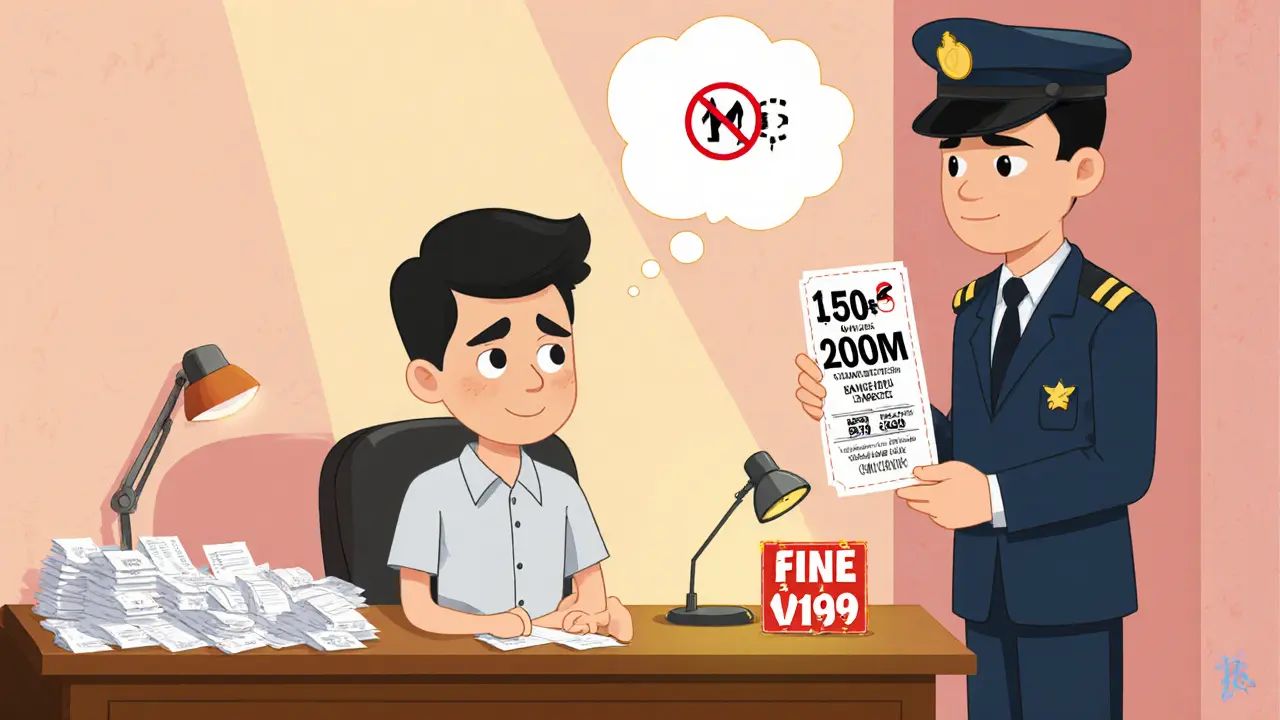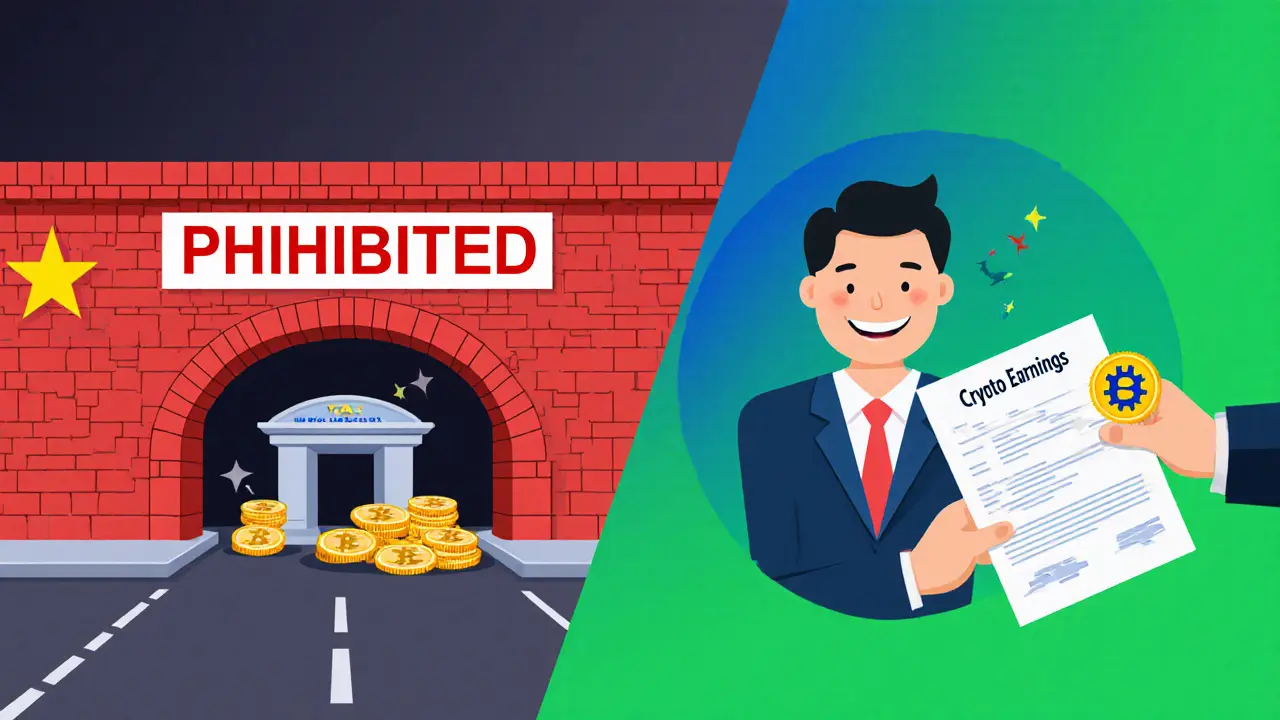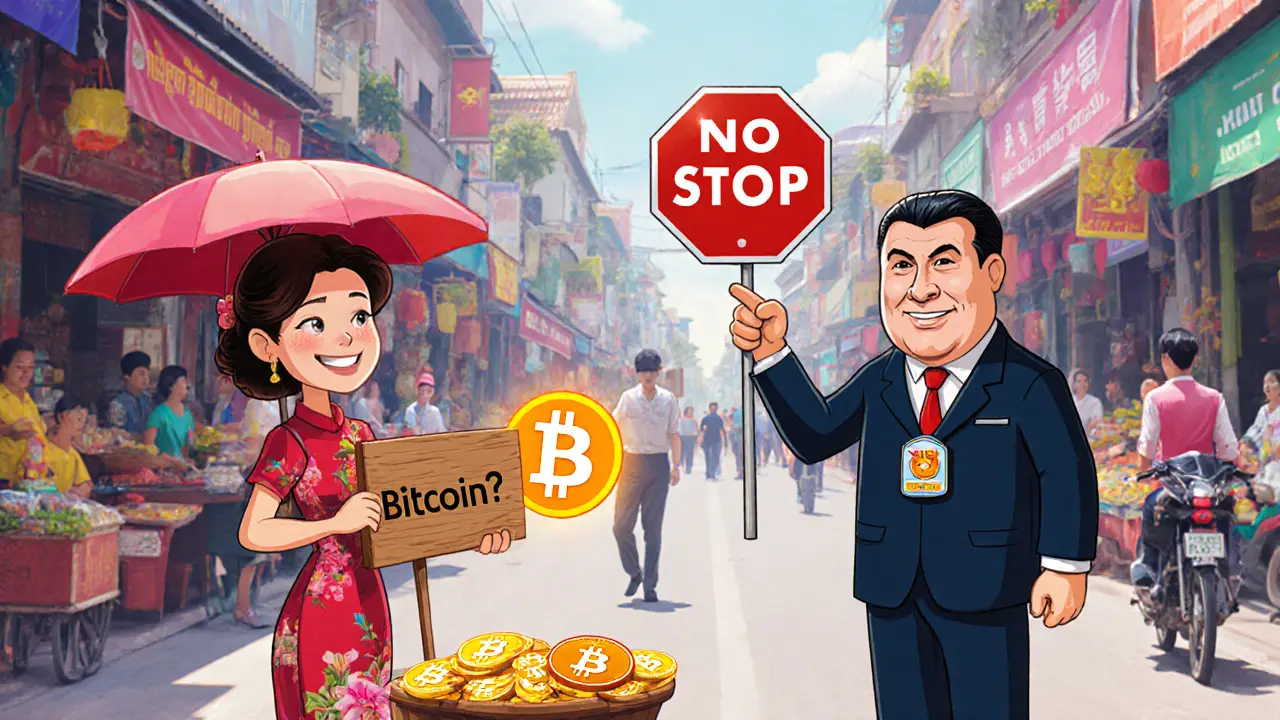Ever wonder why news outlets keep shouting about a Vietnam cryptocurrency fines that can reach 200millionVND? The short answer: Vietnam’s central bank has drawn a hard line against using digital coins as a way to pay for goods or services. If you’re a merchant, a developer, or just a curious observer, you need to know what the law says, how the fines are calculated, and what real‑world enforcement looks like.
Legal Foundations of the Ban
At the heart of the restriction sits the Vietnam cryptocurrency payment ban - a policy formally introduced by the State Bank of Vietnam (SBV) in late 2017 and enforced starting 1January2018.
The ban draws its authority from three key decrees:
- Decree No. 96/2014/ND-CP on administrative sanctions in monetary and banking activities - specifically Clause6, Article27, which lists a fine range of 150million to 200millionVND for any act of issuing, supplying, or using bitcoin and similar virtual currencies as payment.
- Decree 101/2012/ND-CP (amended by Decree80/2016/ND-CP) that defines lawful means of payment - only checks, bank cards, and SBV‑prescribed instruments are recognized.
- Prime Minister Nguyen Xuan Phuc's 2017 directive to develop a legal framework for virtual currencies, which prompted SBV to publish its comprehensive statement on 28October2017.
These legal texts do not outlaw ownership of crypto assets; they merely prohibit treating them as a medium of exchange. That distinction creates a gray area where holding Bitcoin is tolerated, but accepting it for a coffee, tuition, or rent is illegal.
Understanding the 150‑200MillionVND Penalty
The fine itself is calibrated to deter both small‑scale merchants and larger enterprises. Converting the range at today’s exchange rate (≈$6,500‑$8,900 USD) shows a serious financial bite:
- Minimum fine - 150millionVND: Applied when a first‑time offender is caught in a low‑impact transaction (e.g., a local shop accepting crypto for a single purchase).
- Maximum fine - 200millionVND: Reserved for repeated violations, large‑scale operations, or cases where the transaction is linked to money‑laundering concerns.
SBV’s enforcement guidelines also note that the fine can be accompanied by a temporary suspension of the business’s banking privileges, making the economic hit even sharper.
How Enforcement Has Played Out
Since the 2018 kick‑off, the SBV has taken a mix of warning‑first, fine‑later approaches. A few notable episodes illustrate the pattern:
- University tuition case (July2017): A Vietnamese university announced plans to accept Bitcoin for tuition. SBV intervened immediately, issuing a warning that any acceptance would breach Decree96. The university retracted the offer before the fine could be levied.
- Retail crackdown (November2019): SBV reported coordinated penal actions against merchants who advertised crypto‑payment options. Exact numbers weren’t disclosed, but several businesses faced the 150‑200millionVND penalty.
- Underground peer‑to‑peer activity: Community forums like Bitcoin Vietnam News reveal that many users continue to transact off‑platform to avoid detection. While this reduces the number of formal fines, it underscores enforcement limits.
Overall, the SBV’s strategy focuses on high‑visibility targets-large merchants, online marketplaces, and educational institutions-while smaller, informal trades often slip under the radar.

Impact on Vietnam’s Crypto Ecosystem
Even with the payment ban, Vietnam ranks 8th globally in crypto adoption according to Chainalysis Global Crypto Adoption Index (2021). Why?
- Investors treat crypto primarily as an asset class, not a payment method. Holding and trading remain legal, allowing a vibrant exchange market.
- High inflation and limited access to foreign currencies push users toward crypto for wealth preservation.
- Digital‑payment growth (35% annual increase since 2015 per SBV’s 2019 Payment Systems Report) creates demand for alternative, faster channels-crypto fills that niche despite the ban.
However, the ban does introduce friction for merchants seeking to broaden payment options, and it adds regulatory risk for crypto‑related startups that might be perceived as facilitating illegal payments.
Regional Comparison: How Vietnam Stands Apart
Neighbouring countries have taken markedly different routes:
- Thailand: Adopted a licensing regime for crypto exchanges in 2018, allowing limited payment‑token services under strict oversight.
- Singapore: The Monetary Authority’s 2017 Payment Services Bill created a clear licensing framework for digital payment token providers, encouraging innovation while safeguarding consumers.
- Vietnam: Maintains a blanket prohibition on crypto as payment, positioning the country among the strictest in Southeast Asia.
Experts like Dr. Nguyen Xuan Thanh (Harvard Kennedy School) argue that Vietnam’s approach protects monetary sovereignty but sacrifices potential fintech growth. Meanwhile, blockchain analyst Le Hong Hiep (ISEAS‑Yusof Ishak Institute) says the ban “misses an opportunity to harness blockchain while failing to address the underlying demand for alternative payment methods.”

Future Outlook: Is the Ban Likely to Change?
Recent legislative drafts suggest the core ban will stay, but nuances are evolving:
- The 2021 Draft Decree on Management of Virtual Assets kept the payment prohibition but framed crypto as a taxable asset.
- SBV’s 2022 Monetary Policy Report reiterated the fine structure, yet the Ministry of Finance’s 2022 Draft Circular on Tax Management signaled a willingness to recognize crypto earnings for tax purposes.
- In a May2023 VnExpress interview, former Deputy Director Dr. Tran Ngoc Ca noted that while the fine remains enforceable, practical enforcement is becoming harder as underground usage grows.
Those signs point to a possible regulatory modernization: the state may keep the ban on payments but introduce clearer tax rules, reporting obligations, and perhaps a licensing path for “crypto‑payment gateways” that operate under SBV supervision. Until such reforms materialize, merchants should treat the 150‑200millionVND fine as a real, enforceable risk.
Key Takeaways Checklist
- Accepting crypto as a direct payment in Vietnam is illegal under Decree96/2014/ND‑CP.
- Violations trigger fines of 150‑200millionVND, plus possible banking suspensions.
- Enforcement focuses on high‑profile merchants; small peer‑to‑peer trades often avoid detection.
- Holding or trading crypto assets remains legal - the ban is payment‑specific.
- Regional peers (Thailand, Singapore) offer licensed alternatives; Vietnam’s stance is among the strictest.
- Future drafts hint at tax integration but keep the payment prohibition.
Frequently Asked Questions
What exactly is prohibited under Vietnam’s crypto payment ban?
The law forbids any act of issuing, supplying, or using Bitcoin or similar virtual currencies as a means of payment for goods, services, or debts. It does not ban owning, transferring, or trading the assets themselves.
How are the 150‑200millionVND fines calculated?
The penalty range is fixed by Decree96/2014/ND‑CP. A first‑time, low‑impact violation attracts the minimum 150millionVND. Repeated or high‑value violations can be fined the maximum 200millionVND, with possible added sanctions like banking suspensions.
Can a business appeal a fine?
Yes. The business can submit an administrative appeal to the SBV within the statutory period, providing evidence that no payment was actually processed or that the transaction fell outside the legal definition of a payment.
Does the ban affect cryptoexchange platforms?
Exchanges may operate as long as they do not facilitate merchant payments. They can provide spot‑trading, custody, and conversion services, but any feature that allows vendors to accept crypto at checkout would be illegal.
What are the penalties for individuals who receive crypto as payment?
Individuals are subject to the same fine range. If an individual receives crypto for a service (e.g., freelance work) and the transaction is deemed a payment, the SBV can impose the 150‑200millionVND sanction.

harrison houghton
October 16, 2025 AT 19:04They ban crypto payments but let people trade it like it's a national sport? That's not regulation, that's cognitive dissonance on a national scale.
It's like outlawing alcohol sales but letting people brew it in their basements and trade it for baseball cards.
The state wants control without responsibility. They don't want you using Bitcoin to pay for coffee, but they're fine with you using it to bet on the stock market like it's a casino with better odds.
And yet they don't even have the guts to shut down the exchanges. So who are they protecting? The banks? The bureaucrats? Or just their own fragile sense of order?
Real sovereignty isn't about banning things. It's about building something better. Vietnam's policy isn't strong-it's scared.
They're treating blockchain like a virus instead of a tool. And tools don't get banned. They get mastered.
Meanwhile, kids are using VPNs and P2P apps to buy coffee with crypto like it's 2014 all over again. The law didn't stop adoption. It just made it underground.
That's not enforcement. That's failure dressed up as policy.
DINESH YADAV
October 17, 2025 AT 09:22What a joke. Vietnam is a sovereign nation. Why should we follow some Western crypto hype? Our central bank knows better than some tech bros from Silicon Valley.
Let them have their Bitcoin. We have our own currency, our own system, our own dignity.
150 million VND fine? Good. Let them learn. Foreign money games don't belong here.
India does the same. We don't bow to crypto cults. Vietnam is strong. Respect.
rachel terry
October 18, 2025 AT 03:24Can we just acknowledge that this whole thing is performative? Like the state is putting on a show for the IMF while everyone in Hanoi is quietly trading on Binance via Telegram bots
And the fines? Please. That's just theater. Nobody actually gets hit with 200 million unless they're some rich guy who posted a TikTok about accepting Dogecoin for pho
Meanwhile, the real story is how 40% of Vietnamese millennials own crypto and no one's stopping them
It's not a ban. It's a suggestion with a side of bureaucratic panic
Susan Bari
October 18, 2025 AT 20:29It's fascinating how the same people who scream about financial freedom will panic when you mention crypto as payment
They want decentralization until it threatens their control
Then suddenly it's 'monetary sovereignty' and 'economic stability' and 'we must protect the people from themselves'
But they never ask why the people need alternatives in the first place
It's not about Bitcoin
It's about power
And power doesn't like being questioned
So they fine you instead
Sean Hawkins
October 18, 2025 AT 22:47Let me clarify a common misconception: the ban only applies to using crypto as a medium of exchange, not as an asset. That’s a critical legal distinction.
Under Decree 96/2014/ND-CP, Article 27, Clause 6, the penalty is specifically for ‘issuing, supplying, or using virtual currencies as payment instruments’-not for holding, transferring, or trading.
Exchanges like VinaBitcoin and Bitkub Vietnam operate legally because they don’t facilitate merchant payments-they’re custodial trading platforms.
And yes, the 150–200 million VND fine is real, but enforcement is targeted. Most cases involve merchants advertising crypto payments on e-commerce platforms or POS systems.
Peer-to-peer cash trades? Almost never prosecuted. The SBV focuses on visibility and deterrence, not surveillance.
Also, the 2022 Tax Circular draft is a big deal-it implies recognition of crypto as taxable property, which is a de facto step toward regulated integration.
So while the payment ban remains, the ecosystem is quietly evolving under the radar. This isn’t stagnation. It’s strategic ambiguity.
Marlie Ledesma
October 19, 2025 AT 13:08My cousin runs a small coffee shop in Da Nang. He got a warning last year because someone paid with Bitcoin for a latte.
He didn’t know it was illegal. He thought it was just a cool way to accept payment.
The SBV didn’t fine him. They just sat down with him, explained the law, and gave him a pamphlet.
He switched to QR code payments after that.
I just wish more people knew how to navigate this stuff without fear.
It’s not about being pro or anti-crypto.
It’s about knowing the rules before you break them.